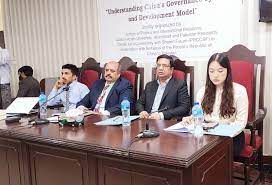China model, reforms among key topics discussed at international seminar

Islamabad: Chinese governance model, reforms, global developments advancing the concept of a Community with Shared future, dialogue of civilization, and socio-economic transformation under the massive Belt and Road Initiative (BRI) and most specifically China-Pakistan Economic Corridor (CPEC) were discussed by the experts at an international seminar here.
The seminar was jointly organized by school of politics and International Relations, Quaid-e-Azam University, Islamabad, and Pakistan Research Center for a Community with Shared Future (PRCCSF) in collaboration with the Embassy of the People’s Republic of China to Pakistan.
Welcome remarks from the Chinese delegates were given by Professor Li Huailing, who is a Dean of the Institute for a Community with Shared Future, Communication University of China (CUC), Beijing, China.
He emphasized explaining how China is a driving force for economic development in the region and connecting the world.
Dr Dou Yulei, Associate Professor, School of Economics and Management, Communication University of China (CUC), through the virtual address, shed light on President Xi Jinping’s perspective of a community with a shared future and the concept of dialogue among civilizations, considering that. Professor Wang Sixin, Deputy Dean of the ICSF, Communication University of China, talked about China Global Development Initiative and the way forward for the International Community and enlightened the audience on how the Chinese government is making efforts as a peace broker by creating economic linkages, binding the nations together.
The conference started with a welcoming note from Director of SPIR, Professor Dr Zafar Nawaz Jaspal who presented his talk on China’s contemporary global world order, explaining how Great Powers rejuvenated the alliances and China’s role in establishing peace and harmony between the Kingdom of Saudi Arabia and the Islamic Republic of Iran.
Moreover, he explained how China is hammering Geo-economics rather than geostrategic factors through its Chinese investments in Pakistan and the region, and projects like the CPEC are a source of immense value for Pakistan, Afghanistan, and the other states in the region. “In such circumstances, we must determine how to harness cooperation dividends for our economic prosperity,” he added.
This was followed by the opening remarks of Khalid Taimur Akram, who is an Executive Director of PRCCSF, who presented a copy of the book Governance of China, authored by Chinese President Xi Jinping.
Salman Ali Bittani, Lecturer at the School of Politics and IR, Quaid-i-Azam University, Islamabad, and currently a Ph.D. candidate in China, explained the role of soft power in projecting the image of a state.
He explained cultural cooperation as a tool for soft-power projection with a case study of China and Pakistan. Later, a concise speech by Saifullah Danishwar from the University of Punjab, Lahore, Pakistan, elucidated how BRI is seen as a tool for connecting partner countries. Liu Bei, a Ph.D. Scholar from the Institute for International and Area Studies (IIAS), Tsinghua University, Beijing, chronicled the role of media in generating and increasing narratives regarding the efficiency of the BRI in connectivity and explained how media from both states, Pakistan and China could help to foster peace and harmony. The seminar concluded with a question and answer session in which participants from both Pakistan and China exchanged keenness and enthusiasm.
The Seminar was attended by the faculty members of SPIR, PRCCSF researchers, Chinese Embassy officials, print and electronic media reporters and nearly 100 undergrade and post grade students.





